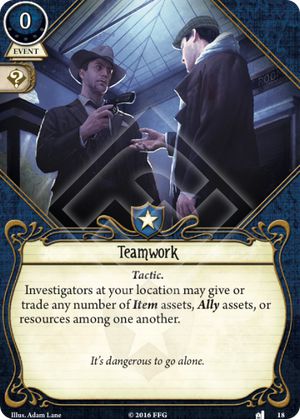-
You can exchange control of assets in play; you cannot trade cards in hand.
- You can give resources from one investigator to another; you cannot place tokens from one card in play to another.
이벤트
전술.
비용: 0.
당신과 같은 장소에 있는 조사자들은 물품 자산 또는 조력자 자산 또는 자원을 서로 원하는 만큼 주거나 교환해도 됩니다.

FAQs
(from the official FAQ or responses to the official rules question form)Reviews
Teamwork struggles in the course of normal play unless your group goes out of its way to coordinate unlikely asset combos, and even then playing this card likely slows the group down compared to playing independently functional decks.
This card struggles to be consistent, but it's worth noting that because it has the Tactic trait Mark Harrigan can take it.
EDIT: Grammar
Teamwork is a card that, on it's own, requires such a knowledge of the resource dependency of not just your own deck but each of your fellow investigators' decks as well to determine it's usefulness, that the effort involved in getting and analysing that information is better spent picking a different card and doing something more meaningful with your time. However, Teamwork also has the benefit of facilitating some jank, of which I'm going to detail three such instances below:
First, poverty decks, defined by decks that centre around Dark Horse, have an annoying catch-22; they need to have the resource expenditure to get your resources to zero in order to facilitate Dark Horse, but also be cheap enough to operate without resources once Dark Horse hits the field. The solution is usually cards that have additional avenues for spending resources, AKA Fire Axe and Dig Deep, but investigators that can take guardian and survivor cards have a third option; donating your resources away with Teamwork. So William Yorick, Tommy Muldoon, "Ashcan" Pete, and Zoey Samaras will probably want to including at least one copy of Teamwork, should they decide to go the poverty route.
Second, a deck archetype I call the Charity Gala, with none other than Jenny Barnes in a full support roll. Coupled with Charles Ross, Esq. and Joey "The Rat" Vigil, its main purpose is to bankroll the rest of your team, either by paying for their assets, for straight up giving them money with Teamwork. The Ally exchange part will actually see use as well in this deck; Joey "The Rat" Vigil is a stupidly expensive card, but his effect, and highest health/sanity values, are useful to any investigator, especially if Jenny foots the bill, and Charles Ross, Esq.'s discount affects everyone regardless of who's controlling him.
Third, and while I usually don't advocate begging, I'll make an exception for the poorest investigator in the game bar none; Mark Harrigan. I cannot stress enough how much Mark struggles with economy. Not only is he restricted to guardian, neutral, and lvl 0 tactic cards (AKA "I've had worse…", Emergency Cache, and Act of Desperation), but he also has the fastest draw-engine of all the investigators (which impoverishes him more as he loses out of the one resource stipend gained from drawing cards in the upkeep phase), AND he's disinclined from including the cheapest type of cards in his deck; skill cards, on account of having an on-demand Unexpected Courage most the the time. If you're willing to sell your dignity, then do take Teamwork when playing Mark, because Lord knows he needs every scrap of economy he can get.
It is an excellent card in unique circumstances. For example, this saved in 'Stick to the Plan' and a Rogue in the party that generates a lot of resources suddenly makes expensive cards not so expensive to use for the entire party. You lose one round coordinating in exchange for bringing the 'big guns' combo of your deck, this can turn over on an elite encounter.
The bad part is that you are limited to a Guardian and a Rogue, and having too many expensive cards (for this to be useful) can be counterproductive early.